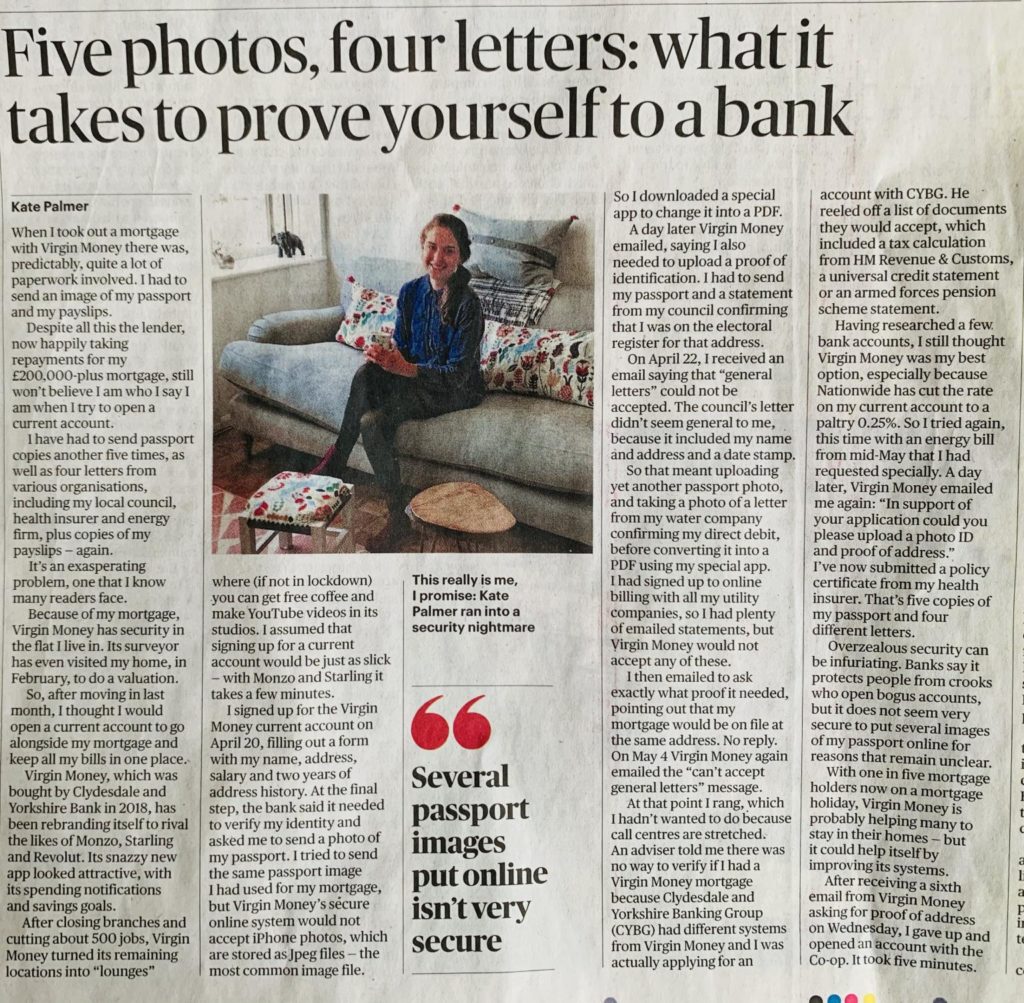
I blogged in April that banking is nothing to do with relationships, it’s about secrets. It's more than this though, it's about trust. Can I trust you with my secrets?
This came home to me as, since then, a few people pulled me up over my whining about my bank. I’ve been whining about my UK bank for a while on twitter as their call centre shut down in March and I can’t talk to them.
Why don’t you change bank, Chris? Move to a challenger bank, Chris! Why are you whinging when everything is open, Chris?
Well, truth is that it’s not open. In my own psyche, like so many others, changing bank is not easy. Sure, we may have switching rules and such like, but the account opening process is such a pain that very few of us do it.
For example, just a quick look at this write-up in the Sunday Times shows what a pain it can be (doubleclick image to see bigger version).
I recently went through this process myself and, in this case, they needed a minimum of three notarised proofs of identity. A notary? What’s one of those?
When you go through this process that sometimes takes weeks or months, the idea of going through it again for a commodity product is ridiculous. Why would you do it?
And there are the two things that make banking different to everything else: (a) a pain to get the product; and (b) once you have the product, it’s a commodity.
Think about it. What other industry or market has any structure like this? Book a flight, order a book, download a movie or arrange a supermarket delivery, it’s all the same. No pain, simple and easy. Sure, services may be similar – a commodity – but there’s not pain in accessing those services.
Banking is completely different. It’s a pain to get the product.
Someone asked me why I don’t leave my bank, and my response was:
Not that. It’s having to typically have a wet signature and then waiting five years to get a decent status, as their risk management won’t trust you without a track record of their own
— Chris Skinner (@Chris_Skinner) May 21, 2020
In other words, it’s not just switching or opening a new account, but the whole account opening process and even then, once opened, the trust process. How long would it take to get my new financial provider to trust me with money? How long would it take to get a line of credit? How big is that line of credit?
I deal with a bunch of financial firms and financial people – as well as real human beings – and we all know that it is difficult dealing with money. Dealing with money, opening accounts, getting loans, enabling credit, is all difficult with people you don’t know and don’t trust.
I guess that’s the rub: people you don’t know and don’t trust.
As a financial provider, you first of all need to know that the person opening an account is the person the claim to be: KYC and AML and all that stuff. That’s why they need the proofs of identity and notarisation.
Then, once you prove you are who you say you are, how can I trust you? You want credit, loans and borrowings? How can I believe you will pay it back?
These are the real reasons people don’t change banks. If you’ve been a good customer of a bank for a decade and now ask for a loan, they will often give it to you. If you’ve just opened an account and ask for a loan, the likely response is maybe, possibly, where’s your history?
No history, no loan, no credit, no anything.
That’s why people stay with banks longer than partners. It’s nothing to do with relationships. It’s all to do with trust.
Oh, and my bank’s shut down has meant that I have opened a new account with a challenger bank. It took ten minutes in the app and works brilliantly. Why did I switch? Because I don’t trust my old bank anymore.
Bye, bye old bank.
Chris M Skinner
Chris Skinner is best known as an independent commentator on the financial markets through his blog, TheFinanser.com, as author of the bestselling book Digital Bank, and Chair of the European networking forum the Financial Services Club. He has been voted one of the most influential people in banking by The Financial Brand (as well as one of the best blogs), a FinTech Titan (Next Bank), one of the Fintech Leaders you need to follow (City AM, Deluxe and Jax Finance), as well as one of the Top 40 most influential people in financial technology by the Wall Street Journal's Financial News. To learn more click here...


